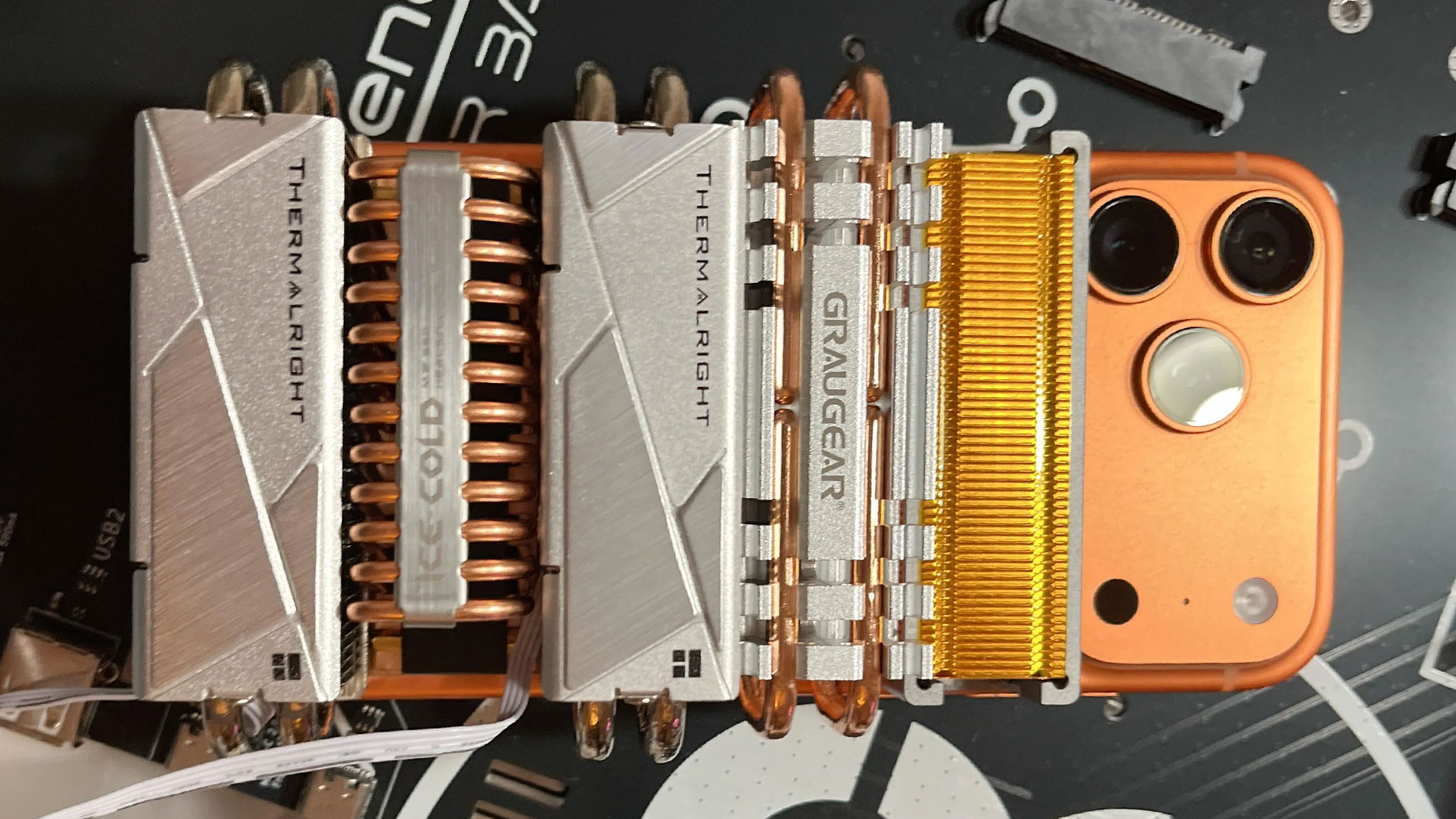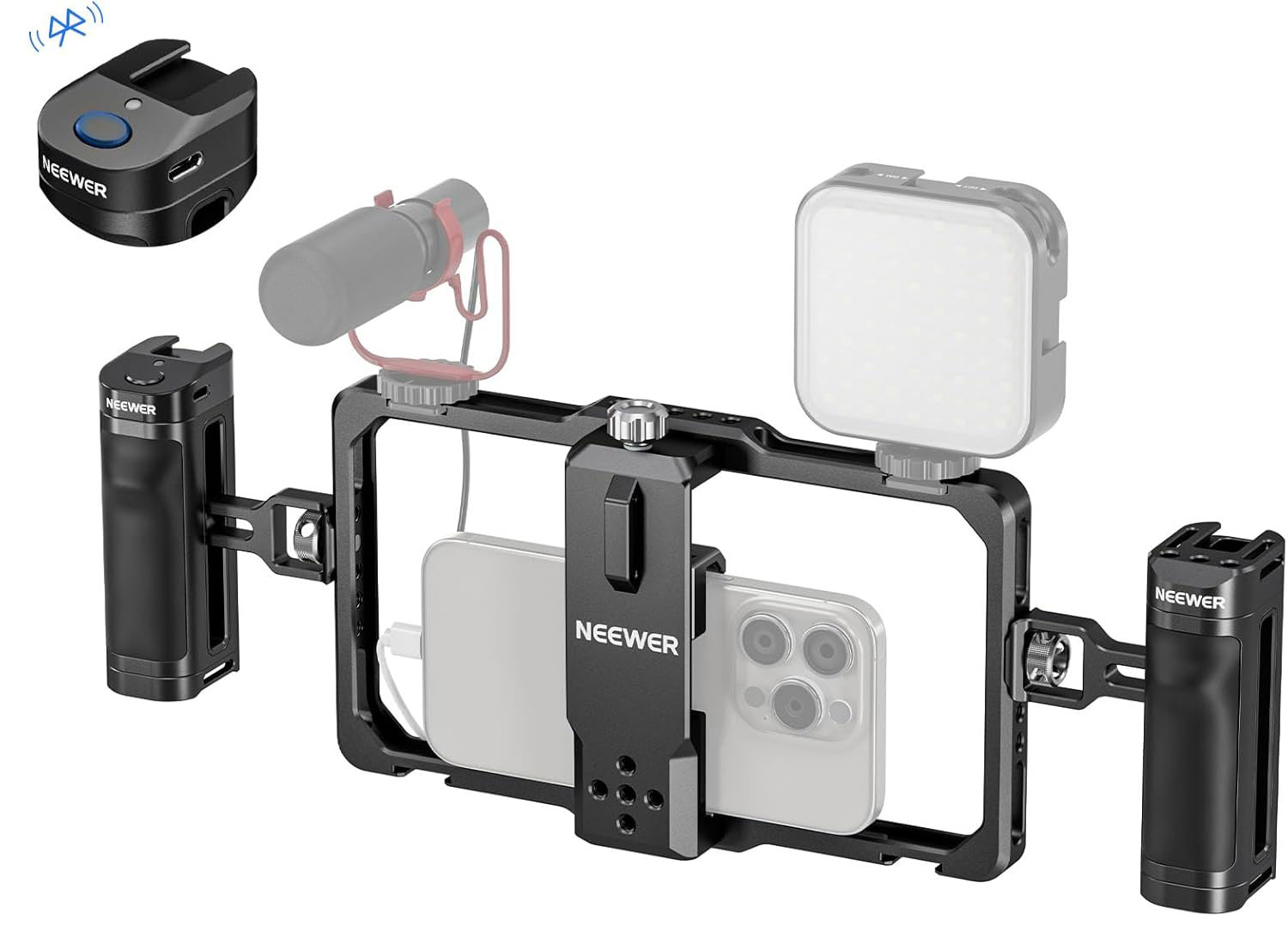Monstrous SSD cooling solution strapped to iPhone 17 Pro Max delivers unparalleled performance — clocks 90% stability in 3D Mark Stress Test, jury still out on hideous aesthetics
Is this what they mean by passive-aggressive?

A smartphone performance enthusiast has shown pictures of their cooler-boosted iPhone 17 Pro Max on Reddit. T-K-Tronix indicates that their Rube Goldberg-esque multiple passive PC SSD cooler contraption elevates the flagship device’s Steel Nomad Light stress test stability score beyond 90% in 3D Mark's Stress Test. From their comments, we think T-K is aiming to improve performance stability for Apple ProRes mode video recording, which is known to make these devices very toasty over prolonged high-resolution recording sessions.
17 Pro Max Cooling with M2 SSD Cooler 90% Stabilty in 3D Mark Stress Test from r/iphone
When boasting about their new stability score, it would have been better if T-K supplied a baseline stability score for the same device, ahead of strapping on the motley array of SSD coolers. While we can’t find any baseline scores from the OP to compare, we found a Max Tech YouTube video where the iPhone 17 Pro Max achieved a 69.4% stability score across a standard set of Steel Nomad Light runs.
Let’s be bold enough to compare these scores, and if we do, T-K's 90.5% performance stability is a significant step up from Max Tech's 69.4%, and could be worth it in sustained Apple ProRes recording sessions. Better sustained and consistent performance stats like this will probably also catch the eyes and imaginations of smartphone gamers.
Vapor chamber cooling is not enough for ultra-enthusiasts?
Apple made a major design detour with the release of the iPhone 17 Pro models. The glass back construction was swapped out in favor of an aluminum wraparound unibody, with a much reduced sliver of glass on the back, left to maintain wireless charging and MagSafe compatibility.
The A19 Pro chip inside the new flagship iPhones is certainly a great performer, and we recently compared it to other platforms, including the AMD Ryzen 9 9950X. However, Apple seems to have recognized the need for sustained non-throttling performance by reworking its flagship smartphone cooling to employ vapor chamber tech for the first time.
At launch, Apple indicated that the vapor chamber, filled with deionized water, dissipates heat throughout the system. When combined with the aluminum unibody, the firm asserted the new system was 20 times better at cooling than the titanium used in the iPhone 15 Pro and iPhone 16 Pro.

While T-K’s solution for better cooling remains passive, it won’t be comfortable for many situations. If it is easy to take on and off (MagSafe?), then it might earn wider appeal. However, with its added bulk and sharp edges, it is probably going to remain a niche video recording accessory. As T-K adds, later in the thread, “It's actually only useful if you max it out by shooting professional video and putting your iPhone in a cage instead of a case.”
Get Tom's Hardware's best news and in-depth reviews, straight to your inbox.
Follow Tom's Hardware on Google News, or add us as a preferred source, to get our up-to-date news, analysis, and reviews in your feeds. Make sure to click the Follow button!

Mark Tyson is a news editor at Tom's Hardware. He enjoys covering the full breadth of PC tech; from business and semiconductor design to products approaching the edge of reason.
-
Notton Tom's has a bunch of SSD heatsinks. I'm sure they can test this out.Reply
It might be nice to compare the monstrosity setup to a thermoelectric cooler for gaming phones. -
Amdlova It's why I get flagship cellphones to keep it on batery saver... They don't become a toasterReply -
Vanderlindemedia Open casing. Expose the CPU/GPU side. Install cold-plate. Put heatsink compound. Attach to phone's body. Done. Installing all those coolers won't make a beneficial improvement anyway without ruining it's usability.Reply -
kealii123 Reply
The point isn't usability, the point is viewsVanderlindemedia said:Open casing. Expose the CPU/GPU side. Install cold-plate. Put heatsink compound. Attach to phone's body. Done. Installing all those coolers won't make a beneficial improvement anyway without ruining it's usability.